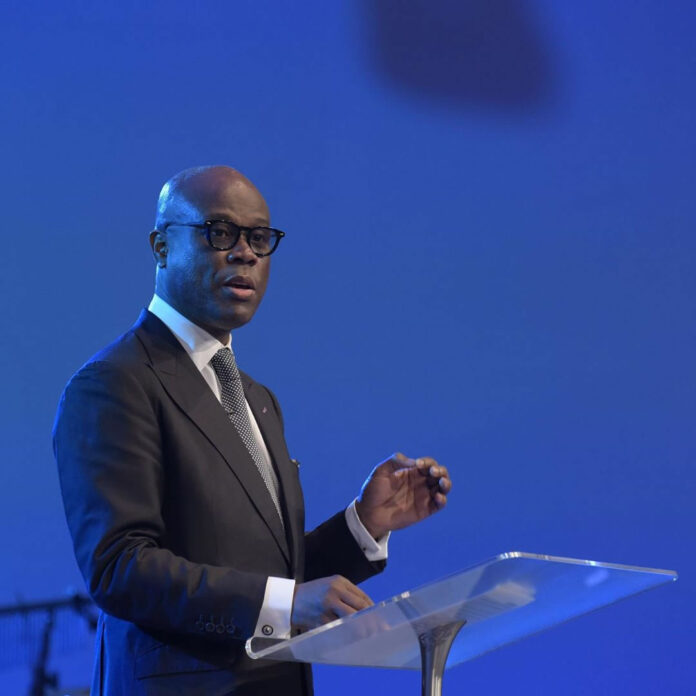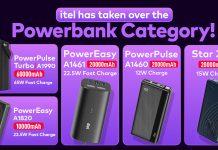In an interview on CNN’s First Move with Julia Chatterley, Access Bank CEO Herbert Wigwe discussed the company’s expansion plans in Africa and beyond, balancing needs with digitization and Access Bank’s efforts to provide financial services to women.
QUOTES
Wigwe on Access Bank’s African expansion plans:
“It’s something that we’ve been planning as part of our corporate strategic planning 2017, and the whole idea has been to support our correspondent banking business, to support our payments business and to basically ensure that there is greater trade within the continent. So, for us, what are we doing? We’re basically making sure that we have a strong presence in all the major trade centres in the continent.”
Wigwe on Access Bank’s outlook for 2022:
“I think we’re on track. I think in terms of profitability our different franchises are doing exceedingly well. And I think 2022 perhaps is actually going to be a big, big year for the institution.”
Wigwe on how Access Bank is supporting women:
“In 2014, we created the W-program which is a more robust program, and it’s about inspiring, it’s about connecting and it’s also about empowering women. Right from the professional lady who perhaps whether they’re seeking re-entry, or their businesswoman who needs to be supported or the more – more you know sophisticated businessperson who is thinking about succession and wants a bank that can help them. All of those things were provided. We took it deeper and deeper into maternal health care schemes. Schemes that no other institution in the world have basically looked at. It’s the reason we won several, several awards.”
Wigwe on Access Bank’s focus on women in Nigeria:
“Coming back to Nigeria, and what it has done for women, half of our customer base today are women, all right. And because they know that they will be served by Access. And if they needed financing, they will be supported by Access. Most times, they have gotten the money, it’s about supporting them with respect to various programs that would help educate them on what to do, how to grow their businesses, all of those type of things. So, that is what has made us so different and the fact that most women would rather bank with Access than anywhere else.”
JULIA CHATTERLEY, CNN INTERNATIONAL: Welcome back to ‘First Move’. And to a tale of transformation in Africa’s banking sector. Nigeria’s Access Bank which has grown from a small commercial operation to a global financial brand. Not satisfied by that. Access now wants to provide banking services to half of all Nigerians in 2022 and act as the continent’s gateway to the rest of the world. Herbert Wigwe is the CEO of Access Bank and he joins us now. Herbert, fantastic to have you on the show. I think core to being that payments gateway to the world is expansion. And you’ve had an incredible year expanding particularly into the south of Africa, Botswana and Mozambique, Zambia, South Africa. Talk to me about what these expansions going to mean for performance.
HERBERT WIGWE, CEO, ACCESS BANK GROUP: Well, let me put it this way, Julia. It’s something that we’ve been planning as part of our corporate strategic planning 2017, and the whole idea has been to support our correspondent banking business, to support our payments business and to basically ensure that there is greater trade within the continent. So, for us, what are we doing? We’re basically making sure that we have a strong presence in all the major trade centres in the continent, to make sure we can access UK as a strong encore that we can support correspondent banking. And that we can physically build you know that presence in the continent that supports payment within the continent. So, I think we’re on track. I think in terms of profitability our different franchises are doing exceedingly well. And I think 2022 perhaps is actually going to be a big, big year for the institution.
CHATTERLEY: You know the one that catches my eye is South Africa. This is a tough market. This is a mature market. It’s undergoing significant digital disruption as well in the financial sector space. What’s the specific strategy there?
WIGWE: Well, you know, Julia, when I decide we went to the UK, it was a very tough market. And I think the market is to get South African bank in the UK. Now, what are we doing in South Africa? We’re basically going to ensure that it becomes a hub for the continent as far as correspondent banking services are concerned. We will help support corporate. Their interest in niches in that market that are yet to be served. We will help to ensure with our financial (INAUDIBLE). Without revealing so much more of the strategy, there is – there are interesting markets that have not been served that will basically cater for. But apart from that, you need to see also the context of a large layer in the continent and partly serve our operators in different parts of the continent and putting that whole network together is extremely, extremely important. Well, besides that, truly important, correspondent banking is important and of course, (INAUDIBLE) in the global support in the countries within the South African context which is of course the largest (INAUDIBLE) in the continent will be very important for us.
CHATTERLEY: Yes. Just to give my viewers some perspective here. I read that 30 percent of your profits will actually going to be outside of Nigeria this year. Just to give you a sense of where that profitability is generating. But I did mention in the intro, and I’ve seen you say it, that one of your ambitions is to provide one out of every two Nigerians with financial access and with banking services. Where are you today? And to what extent of those that you don’t currently service, are they being serviced by some of the digital players too? Do you need everybody? Do you need that many or do you cherry-pick who your clients are? Is there room for all?
WIGWE: OK. We have about 200 employees in Nigeria. There is still a large advance population.
CHATTERLEY: Right.
WIGWE: We have (INAUDIBLE) of major commercial cities who don’t have a bank to basically service them. What are we doing? I mean our platform is showing that today, we bank for our 50 million Nigerians, which means that we bank, what, 25 percent of the population, but in terms of the banking population actually. All right, we bank about a third of the bankable population. Now, backing one of every two Nigerians takes so close to about 100 million people. In terms of bankable Nigerians, it will be anywhere between 80 million and 100 million for us to actually get that figure right. So, we’re going to pursue this whole activity through agency banking network and find out. We’ve created a different type of branch network is specifically in major cities. And today, we’re probably, what, bringing in about 700,000 customers every month. And I think that figure is going to grow a lot more in 2022 with some of the things we could have done, some of the increase of agency banking that we’ve done. Now, the question as to whether we need all of those people, is if — if you had gone back 20 years ago, you’d have said some of these customers who don’t have enough disposable incomes we’ve banked. Well, let me tell you one, Julia. Technology has changed that whole narrative, all right? There is a cheaper cost to service all of those people. But besides that, we see ourselves as one of those officials that is leading change in Nigeria by providing a greater financial institution. And that in itself would help to jumpstart and support – support the economy. So, there are several reasons for one doing it. And at the end of the day, it is profitable to bank them. High level of individuals, private banking, applied professionals, is a market that we are very familiar with but is also a very competitive market and the margins are thinning out there. So, what we’ll need to do is actually take it down market, and ensure that there this greater financial — just imagine, some of the things we just said, the Central Bank have been pursued by the way to ensure that all of these compelled the diplomats of our market and ensure a financial (INAUDIBLE).
CHATTERLEY: Yes. I mean, I know you have actually doubled IT spending between 2019 and 2020. So, it is something that your incredibly focused on. How do you choose sort of which customers you want to go to? I know you’re incredibly focused on accessing women, helping them build their businesses as well. But this is also, and it goes back to, I think, the point that you made. The Gen Z were never going to go into branch and then you’ve got the other end to the scale. Those that are like – look at – I do want to access via my mobile phone or on a desktop. I want that touchpoint with the branch. It’s – even within the disruption that we’re seeing it, it’s a complex market and it’s a huge continent.
WIGWE: Let me tell you what we’ve done. I mean there are two perspectives to the bank. We also had the other – traditional bank that is serving customers who may want to go some branches. But let me also let you know that if you look all over and ask yourself, banks shutting down branches – the reality is that you still need a reasonable number of respectable branches if you like. Now, we also have, all right, that digital solution that serves to customers who don’t even want to get into a bank branch. All right. That just see a customer based – still being banked by Access. Now, we understand that the picture clears maybe getting an interesting proportion of that customer base. But guess what, at the end of the day, if we have a physical branch, even if the customer doesn’t want to get into a bank branch, it helps from an integrity standpoint and for the customer to just know that he also has a place to go to just in case he had a problem. But remember, that is not just about transactional banking, it is about supporting other aspects of their lifestyle needs. It’s about giving them a decent mortgage. It’s about providing several things that some of the things they are even not aware of. But we are making sure that we are serving these customers properly even as we speak. But let me tell you about women and some of the great things which I think we’ve done. In 2006, we were part of what we referred to as the gender department program. At that time, what we wanted to do was basically help provide financial services to women and help support their businesses grow and we basically set a target working with the IFC of how many women we wanted to grow and what threshold we wanted to take them as far as the profitability is concerned. We did extremely, extremely well, Julia. And let me put it this way. I think we have less than 1 percent in terms of default (INAUDIBLE) was concerned.
CHATTERLEY: Women are great credit.
WIGWE: Yes. I mean, and I don’t know why.
CHATTERLEY: Diligent.
WIGWE: Let social pressure are there. I don’t know what it is. The nature of products we provided but that was reality. But eight year after, in 2014, we created the W-program which is a more — much more robust program, it’s about — and it’s about inspiring, it’s about connecting and it’s also about empowering women. Right from the professional lady who perhaps whether they’re seeking re-entry, or their businesswoman who needs to be supported or the more – more you know sophisticated businessperson who is thinking about succession and wants a bank that can help them. All of those things were provided. We took it deeper and deeper into maternal health care schemes. Schemes that no other institution in the world have basically looked at. It’s the reason we won several, several awards. But coming back to Nigeria, and what it has done for women, half of our customer base today are women, all right. And because they know that they will be served by Access. And if they needed financing, they will be supported by Access. Most times, they have gotten the money, it’s about supporting them with respect to various programs that would help educate them on what to do, how to grow their businesses, all of those type of things. So, that is what has made us so different and the fact that most women would rather bank with Access than anywhere else.
CHATTERLEY: Yes. And I’m secretly — are not so secretly very passionate about this. I have about 20 more questions for Herbert, so you have to promise to come back and we’ll speak to you soon or I’ll see you in Nigeria hopefully at some point, too.
WIGWE: I’m ready for you Julia.
CHATTERLEY: There we go. You’ve invited me now. Herbert Wigwe, CEO of Access Banks. Great to speak to you. Thank you so much for joining us today. And I’ll see you soon.
https://transcripts.cnn.com/show/fmjc/date/2021-11-25/segment/01




























